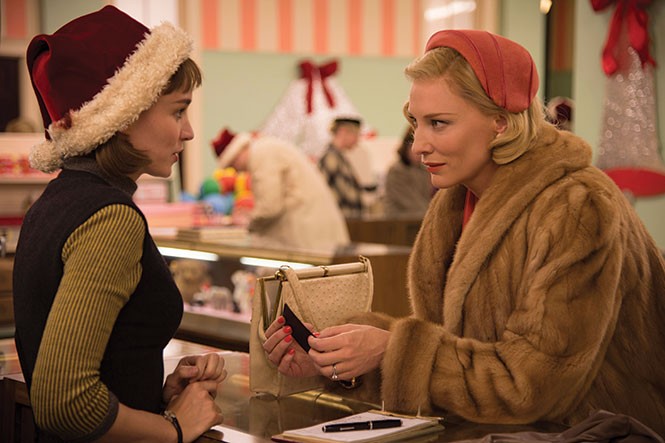
Movies have told love stories as long as there have been movies, but occasionally it takes a movie like Todd Haynes' Carol to remind you how hard it is to show people falling in love.
That moment is particularly complicated in Carol, adapted from Patricia Highsmith's pseudonymously published 1952 novel The Price of Salt. And that's because the two people falling in love with one another, circa the winter of 1952-1953, are both women. Therese Belivet (Rooney Mara) is a young shopgirl working at the toy counter of a New York City department store; Carol Aird (Cate Blanchett) is a married mother recently separated from her husband, Harge (Kyle Chandler). They meet-cute over a Christmas present purchased for Carol's daughter. They meet again when Therese returns to Carol the gloves she left behind in the store, and Carol buys her lunch as a thank you.
But then there's the sequence in which Carol picks Therese up in her car and drives her back to her house in New Jersey for a visit. As Carter Burwell's remarkable score pulses and swells, Haynes transforms the drive into a swirl of images: the lights inside a tunnel; Carol's gloved hands on the steering wheel; a glimpse of her fur coat. It's a perfect impressionistic snapshot of that crazy moment when the thing you might not have dared think was possible suddenly becomes possible.
As perfectly as Haynes pitches that sequence, it's only part of one of the most magnificently directed features in recent years. Haynes finds a brilliant visual motif by repeatedly shooting his main characters through glass—the windows of cars, motel offices, diners—separating them from the world as they look longingly at the things they want, but expect they can never have. He also pinches Therese into corners and edges of his frame, echoing the ways in which she seems constrained.
That idea carries beyond the "love that dare not speak its name" central relationship between Therese and Carol. As heartbreakingly lovely as that romance is while it unfolds, it's also part of a bigger picture in Phyllis Nagy's screenplay about the limitations facing every woman of this time. Therese's pursuit of a career as a photographer seems to rely on the help of a man who wants to hit on her; Carol's hope for a clean break from Harge is complicated by his possessive sense of her as his property. Even the most minor female characters in Carol exist as faces of frustration: Therese's supervisor; a neighbor who snaps at her over a late-night phone call; the wife of a co-worker of Harge's, who sneaks a cigarette at a Christmas party because her husband "doesn't like me to smoke." She's the same character who inspires a key line of dialogue, as Harge tells Carol, that "Harrison's wife asked after you," which Carol immediately corrects to "Jeanette." How hard it is to imagine being in a relationship with a woman, when being a woman generally means being defined by a man.
Yet for all that thematic subtext, Carol is still a love story, and it resonates most thanks to the performances that bring it to life. Rooney Mara is the true revelation, bringing a watchfulness and passivity to Therese's early scenes—with her boyfriend (Jake Lacy), and at that first lunch where she follows Carol by placing an identical order—that convey her sense that she doesn't really have choices of her own. And while Blanchett's screen performances can often seem mannered, that approach generally works for a character like Carol who has lived most of her life in a kind of public performance of "normalcy."
Carol risks turning into finger-wagging at those repressive 1950s, as the plot shifts to a custody battle between Carol and Harge based on a "morality clause," as well as topics like therapy attempting to "cure" homosexuality. These obstacles, though, set up some of Carol's most powerful scenes, building to a resolution that's genuinely in doubt almost until the film's final moment. Haynes nails that moment, too, pulling his focus in a way that puts these two women at long last in the center of their own world. From that dreamy first moment of falling in love, Carol evolves into the real-world power of being in love.